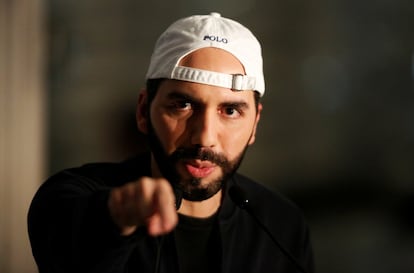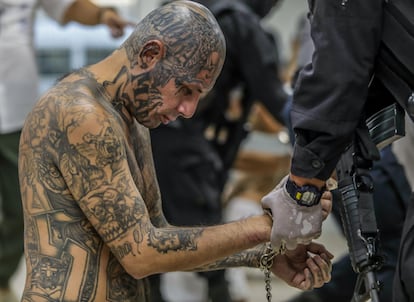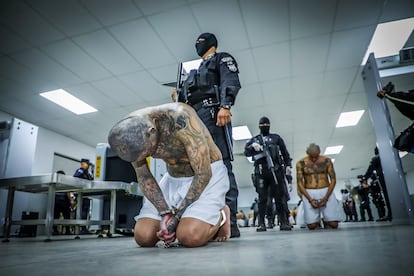The toxic power of Nayib Bukele
The technocrat president of El Salvador has transformed into an authoritarian despot with no regard for the rule of law and human rights


In late February, Nayib Bukele spoke to an audience of military and police officers and thanked them for supporting his controversial security strategy and the war on gangs. As usual, it was an impressively staged event to deliver a message in which he proclaimed himself an “instrument of God” and then unleashed a tirade against the country’s political elites. Bukele congratulated himself for reducing crime rates in the Central American country and praised the military, “You are bringing peace to Salvadorans.”
That nod to El Salvador’s Armed Forces has caused alarm among Bukele’s critics because they say it evokes some of the most challenging times in the nation’s history – the 12-year civil war that ended in 1992. It also signals the radical transformation of a young politician who presented himself as a modern leader capable of solving the nation’s problems into a populist autocrat with no regard for laws and human rights. “All the polls confirm it – 95% of the Salvadoran population supports our work,” Bukele told the military audience.
Bukele captivated a citizenry fed up with violence, corruption, political elites and shameful levels of poverty and inequality. After the civil war ended, the conservative ARENA and the leftist FMLN political parties took turns running the country but never brought real change to the country. Salvadorans blame them for the extreme violence and poverty afflicting the nation. A 2018 poll by Latinobarómetro revealed a high dissatisfaction with politics – barely 28% of the population considers democracy important. Even more striking is that more than 50% of the survey respondents said they don’t care whether they live in a democracy or a dictatorship. Bukele, a skillful communication strategist, understood how to exploit that political fatigue and ineffectiveness when he launched his presidential campaign in 2019 and won the election with more than 50% of the vote.
From then on, Bukele became an unstoppable wave that kept attracting more supporters. Bukele focused on his country’s disenchanted and disenfranchised young people without espousing any clear ideology. He sold himself as the millennial “cool” president, a modern, efficient man who would run the country like a CEO and make things right. The image caught on in El Salvador and the rest of Central America, a region battered by authoritarianism.

Political analyst César Artiga said, “The country’s generalized disenchantment with party politics is undeniable because people don’t believe the traditional politicians transformed the country. We have this leader because he was able to exploit that anger – people were furious. Bukele has fueled even more hatred and conflict while pushing his brand as an innovator who represents a departure from the past.” But the image of the modern and cool president began to crumble in the global arena less than a year after taking office when he stormed into the National Assembly in February 2020 flanked by police and military troops. Bukele sat in the National Assembly president’s chair and called the session to order. His strongarm tactics aimed to resolve an internal impasse when legislators refused to approve a series of loans to fund Bukele’s security strategy.
The opposition decried the stunt and called it a “self-coup,” but most of the country was unfazed, and Bukele’s popular support remained robust. A year later, Bukele’s party swept the legislative elections giving him control of the National Assembly. Bukele has used this unprecedented power to systematically weaken El Salvador’s democratic institutions, remove the attorney general, and replace Supreme Court justices with loyalists. He imposed an ongoing state of emergency that enabled him to deploy military forces to crush the gangs – the maras. Human rights organizations say this has resulted in rampant violations of due process and human rights abuses.
What caused this transformation of a president who wanted to break with the past? “Most people are surprised by all this, but those of us involved in citizen monitoring saw it coming,” said Artiga, who is also a local coordinator for the Regional Agreement on Access to Information, Public Participation and Justice in Environmental Matters in Latin America and the Caribbean. “It’s nothing new – he showed the same disregard for democratic institutions and values when he was mayor of San Salvador, his first public office.”

Bukele, who governs with his brothers as advisors, is now focusing on reelection. Although the country’s constitution prohibits consecutive presidential terms, Bukele hasn’t needed to use his control of the legislature to launch a time-consuming constitutional amendment effort. The loyal Supreme Court justices already issued a constitutional interpretation that says a president can be reelected if he or she leaves office six months before the term ends. Despite the pockets of outrage about his abuse of power, Bukele continues to enjoy high approval ratings and complete control of the country’s institutions as he pursues an increasingly authoritarian course.
“The outlook is looking more complex,” says Artiga. “I don’t see any legal obstacles or an effective opposition that could prevent his reelection.” Artiga sees a bleak future for a country with a Kafkaesque government that seems to have won the battle before it started. “His reelection will increase repression of his critics and organized civil society,” said Artiga. “The state of emergency will become the new normal because it serves to control the people.” Difficult years are ahead for El Salvador, with a leader who sold himself as the world’s coolest president and then turned into a military-supported autocrat who has proclaimed himself an “instrument of God.”
Sign up for our weekly newsletter to get more English-language news coverage from EL PAÍS USA Edition
Tu suscripción se está usando en otro dispositivo
¿Quieres añadir otro usuario a tu suscripción?
Si continúas leyendo en este dispositivo, no se podrá leer en el otro.
FlechaTu suscripción se está usando en otro dispositivo y solo puedes acceder a EL PAÍS desde un dispositivo a la vez.
Si quieres compartir tu cuenta, cambia tu suscripción a la modalidad Premium, así podrás añadir otro usuario. Cada uno accederá con su propia cuenta de email, lo que os permitirá personalizar vuestra experiencia en EL PAÍS.
¿Tienes una suscripción de empresa? Accede aquí para contratar más cuentas.
En el caso de no saber quién está usando tu cuenta, te recomendamos cambiar tu contraseña aquí.
Si decides continuar compartiendo tu cuenta, este mensaje se mostrará en tu dispositivo y en el de la otra persona que está usando tu cuenta de forma indefinida, afectando a tu experiencia de lectura. Puedes consultar aquí los términos y condiciones de la suscripción digital.








































